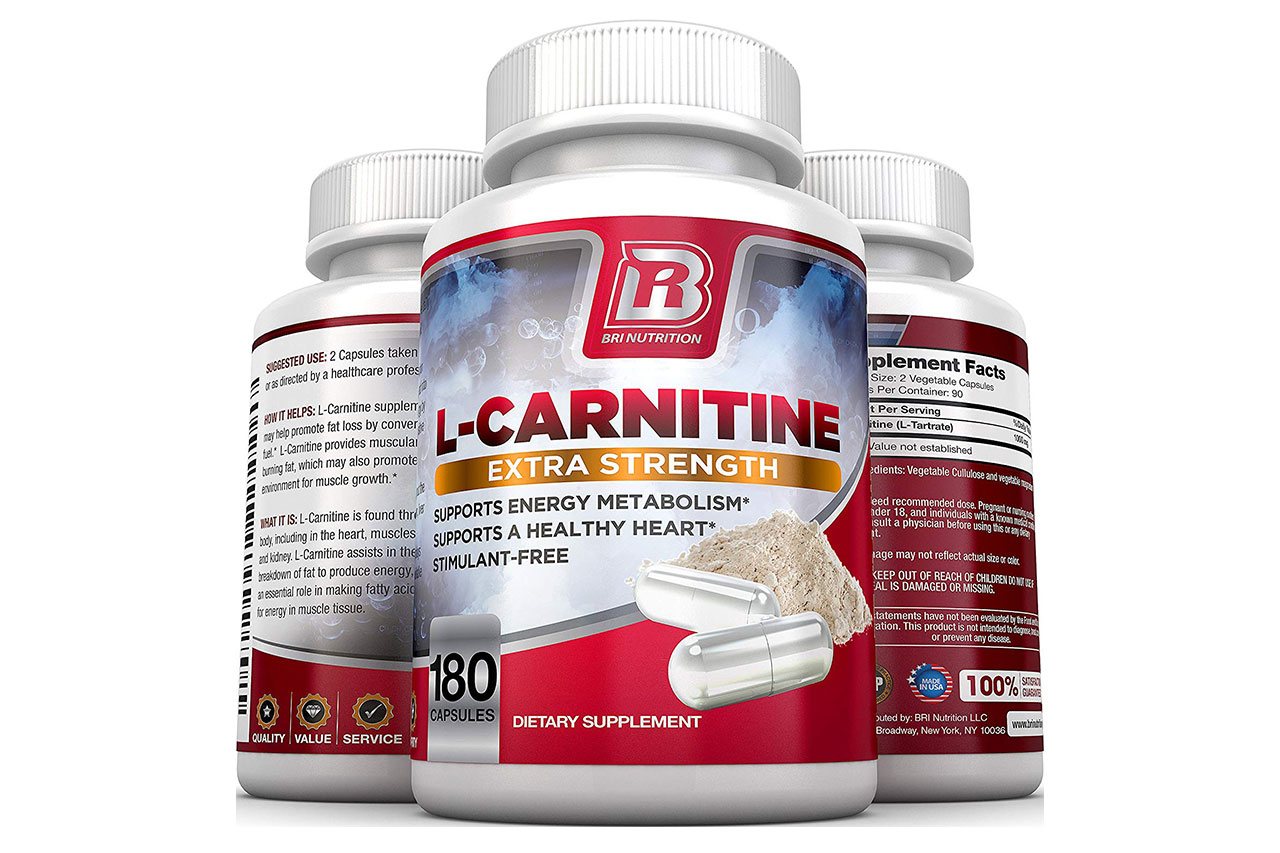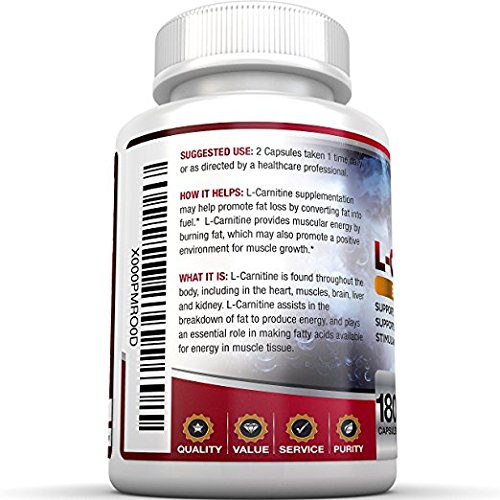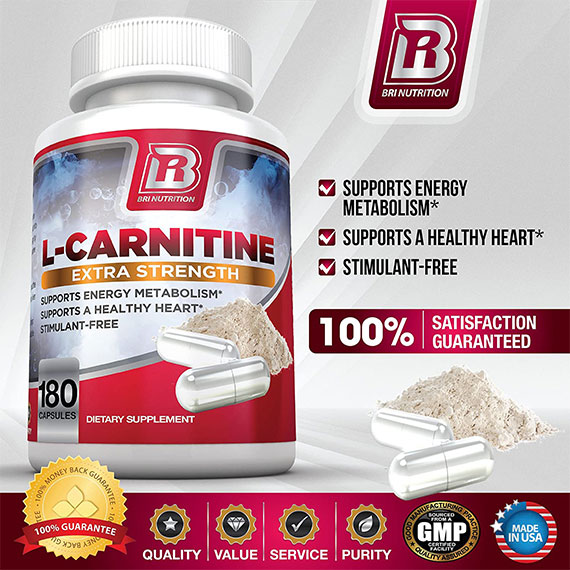This is one of the supplements that is most often associated with fat loss. However, most people only define it as a fat loss supplement and are completely unaware about this amino acid overall.
What is L-Carnitine?
This is a natural, non-protein amino acid, which was first derived from meat during the beginning of 20th century. Terminology Carnis – Latin, means meat, flesh. In the human body, carnitine’s main effect is upon the cell membranes, as it supports and boosts energy production mechanisms.
This is mostly relevant to organs that use big amounts of fatty acids to produce energy, such as the muscles and the heart.
How to obtain L-Carnitine?
Just like most amino acids, L-Carnitine can be found in everyday food- Mostly in animal products, as animal meat has the highest L-Carnitine content. L-Carnitine can also be found in milk, to a lower extent, compared to meat. Even though we get most of the L-Carnitine for the day from food (considering your nutrition plan is on point), our body still synthesizes at least a fourth of that total amount.
This however does not apply for vegetarians, who only get about 10% of their L-Carnitine from food. The biosynthesis of L-Carnitine in the body happens in the brain, kidneys and the liver with the help of two essential amino acids, called lysine and methionine.
This amino acid exists in the organism under two forms- L-Carnitine and acetylated form of acetyl-L-Carnitine (ALCAR), which is derived when L-carnitine connects to a given acetyl group from acetyl-coenzyme A. An important note here would be the fact that the musculature only stores L-Carnitine and is not able to synthesize that amino acid.
Digestion and metabolism of L-Carnitine
L-Carnitine is digested in the first part of the small intestine. Its digestion from food is far more effective, compared to an L-Carnitine supplement (meaning that L-Carnitine cannot replace food). To put it in perspective, up to 90% of L-Carnitine from food is digested, compared to barely 20% from supplements.
This is supposedly because the body is able to digest lower doses of L-Carnitine better and quicker. And even though there is a big mathematical difference here, an L-Carnitine supplement can give you way more of that amino acid than food. Whether a bigger amount of L-Carnitine will be digested or not depends on the amount of the already present L-Carnitine in the body, meaning that if you are in a deficit of this amino acid, the body will digest it quickly once it gets the chance.
This deficit is mostly observed in vegetarians and vegans, who usually and logically have lower L-Carnitine levels in the organism. After ingestion, the carnitine gets in the bloodstream and is then carried to the cells that need it. However, the body cannot store that much L-Carnitine, which is why regular supplementing with L-Carnitine will not lead to additional storages in the tissues. The L-Carnitine levels in the blood are maintained through a process of re-absorption in the kidneys.
Physiological functions
As a whole, in our body, this amino acid is essential for the energy production in the cells. Carnitine has a key role in the fatty acids’ energy metabolism. In order for them to be used, they must go through a process called beta-oxidization, which occurs in the cell mitochondria.
Structurally, the mitochondria is split into two parts, supported by an inner and outer mitochondrial wall. L-Carnitine has a role in both places, with the help of two enzymes called carnitine palmitoyltransferases CPT1 and CPT2. The process itself occurs inside the membrane, however, the problem is that long-chained fatty acids cannot pass the inner membrane on their own.
With the help of CPT1 and CPT2, L-Carnitine connects with these fatty acids and acts as a transmission for them, into the intermembrane space. After this happens, CPT2 splits the molecule to its building blocks. From then on, the long chained fatty acids can go through the process of beta-oxidization and the rest of the free creatine can take its place in the energy metabolism.
L-Carnitine Deficit
If you eat well, supplementing with L-Carnitine won’t be necessary, as deficits will not be reached. Deficit of L-Carnitine is not shown to have significant side effects upon the organism. However, such deficit exists in certain health or genetic diseases, which are differentiated in two types:
Primary systematic L-Carnitine deficit
This is a rare recessive disease of the fatty acids’ oxidization. It is expressed in difficulty of L-Carnitine digestion, in a combination with a process of reverse digestion in the kidneys. This disease affects 3 vital organs- The heart, the central nervous system and the skeletal musculature, leading to progressive cardiomyopathy, myopathy, etc.
For people with this disease, an L-Carnitine injection or oral intake may be a life-saver in certain cases.
Secondary L-Carnitine deficit
This disease is more common, compared to the one we talked about above, even though an accurate statistic for it has not been presented yet. The secondary deficit is expressed with an increase in the L-Carnitine in the urine. Unlike the primary deficit, the reason for the secondary one might be linked to different diseases of other organs like the liver and kidneys.
This disease may also be caused by a defect in the metabolism of fatty acids or intake of certain medications. Some medical treatments like hemodialysis may also cause L-Carnitine levels to decrease with up to 60%
Benefits of L-Carnitine
Metabolite syndrome
Different scientific researches, involving people with normal weight, as well as overweight people and people suffering from diabetes, show a significant effect of L-Carnitine upon insulin sensitivity and the digestion of glucose in the cells.
Reducing Alzheimer’s symptoms
Carnitine in doses of about 3g daily is known to improve mental capabilities and slow down the cognitive functions in adults suffering from Alzheimer’s disease. While half of the researches show good results statistically, another part of them find no difference in the groups of people tested.
ADHD (Attention Deficit Hyperactivity Disorder)
As of now, there have been 2 conducted researches, regarding the effect of L-Carnitine on patients with ADHD. In 2002, a German team of scientists find out that ADHD symptoms in kids significantly improve. Five years later in 2007, a research including over 100 kids, observed different results, depending on the type of ADHD.
No improvements were observed for mixed ADHD, however, such were seen for inattentive type of ADHD. Both researches conducted, have used up to 4 grams of ALCAR daily.
Blood Pressure
Several studies also show a significant potential for L-Carnitine to fight high blood pressure. In one of them, the combination of 1 g of acetyl L-Carnitine and 400 mg of alpha-lipoic acid resulted in a significant drop of systolic blood pressure in people over 55 years of age with diagnosed ischemic heart disease.
Similar results are also seen in younger people suffering from high blood pressure. Significant improvements in insulin sensitivity are also observed.
Secondary prevention in people who have had a heart attack
People who have had myocardial infarction probably would also benefit from taking a standard dose of about 3-4 grams of L-Carnitine a day. There is little research that shows a significant reduction in mortality in L-carnitine-treated groups. There is also a reduction in side effects caused by the heart attack. There are also no studies that do not show positive results, but also negative ones are not observed.
Deficit prevention for people on hemodialysis
Hemodialysis often leads to a deficit of certain substances. L-Carnitine is one of these, and this may lead to worsening of the occurrence or appearance of new side effects of this type of treatment. This is why the intake of L-Carnitine in people on hemodialysis is approved and recommended by the US Food and Drug Administration (US FDA).
L-Carnitine and its role in sports
Carnitine is still one of the best-selling food supplements to help reduce weight loss and improve sporting outcomes. Still, it is the first thing that arises in the minds of almost everyone who decides to lose a few extra pounds and reduce their subcutaneous fat. Carnitine is often used to improve endurance and reduce fatigue during aerobic training.
Unfortunately, Carnitine is also one of the substances with the most contradictory scientific data behind it when it comes to confirming its effectiveness in this context. At this stage, we are not a 100% certain if this supplement significantly improves sport results and body composition for the majority of people. We are unsure as to why result may be present or lacking with the ingestion of L-Carnitine.
Dosing and possible side effects
Overall, L-Carnitine is a safe supplement, that shows no side effects if taken within the recommended dosages. The standard recommended dosage is circling around 3-4 grams per day, split into 3 times, 1 gram each. It is recommended that you take L-Carnitine before or with foods, rich in carbohydrates, when the insulin levels will be high.
The way of intake and dosage depends on the product, and it doesn’t matter if it is taken as a liquid, capsule, pill, powder, etc. It is possible for some people to have a worse breath/sweat smell if the L-Carnitine dosages are excessive. This is simply because trimethylamine levels go up during L-Carnitine metabolism.
Summary
L-Carnitine is one of those substances, one of those supplements that are well known and well-researched but still have a mist over them that needs to be cleared away. It is obvious that L-Carnitine has a serious potential and can be a part of our daily nutrition, which will help us fight certain diseases and overall feel better.
For a finish to this article, we can say that L-Carnitine is completely safe for daily usage, if you are not exceeding recommended dosages systematically.



